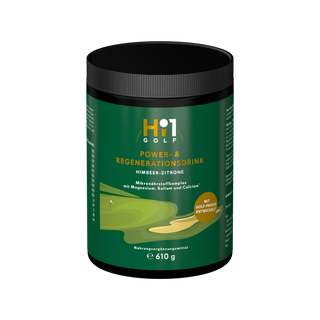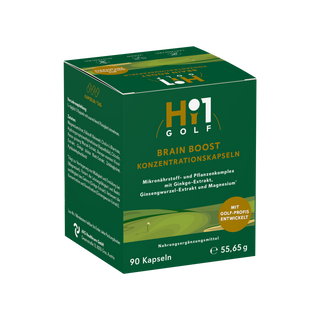Mental training in golf – play better with a clear head
Mental training in golf encompasses a variety of techniques and routines that help improve mental performance, emotional balance, and concentration. These include visualization, targeted breathing exercises, conscious mental preparation for individual shots, and constructive handling of setbacks.
Precisely because golf is heavily influenced by external factors such as weather, course conditions, and social dynamics, your own mental state plays a central role. Those who manage to remain calm and focused even under pressure gain a decisive advantage. Because often it's not just the swing that counts, but also your mind.
Table of contents
- Why is mental training so important in golf?
- How does mental state affect golf?
- What mentally distinguishes successful golfers from others
- How do diet and nutrients influence mental performance in golf?
- How does fatigue affect my concentration on the pitch
- Which nutritional supplements can support mental training?
- How do ginkgo, ginseng, and magnesium help with mental endurance?
- Why is the mind often more exhausted than the body?
- How long does it take for mental training to take effect?
- How can I recognize my mental progress?
- What mistakes should I avoid when mentally training golf?
- How do I integrate mental training into my game on a permanent basis?
Why is mental training so important in golf?
Unlike many other sports, golf is a mental endurance format. A round lasts several hours, there's often a lot of time between shots, and every single shot can determine success or failure. Even small emotional reactions, such as frustration after a missed shot, can disrupt the mental flow and interrupt the rhythm of the game.
Mental clarity helps you stay focused despite setbacks, think strategically, and be present at the right moment. It is the foundation for not only playing well in certain situations, but also maintaining consistent performance over longer periods. In addition to regular mental training, a balanced supply of specific nutrients can also be supportive. Special concentration and energy supplements based on plant-based ingredients and micronutrients, such as those from the Hi1 brand, are therefore increasingly being used in sports to specifically promote cognitive processes, alertness, and emotional balance.
How does mental state affect golf?
Mental state influences virtually every move and decision on the course. Those who feel calm, clear, and stable generally make better tactical decisions and execute moves with more control. Their game appears more structured, their shots more precise, and their focus remains even after a difficult hole.
If, on the other hand, you're mentally tense or stressed, your playing style changes significantly. Your mind wanders, your swing becomes inaccurate, and your decisions are made hectically. The result is avoidable mistakes, not due to a lack of technique, but because your mental state impairs your playing style.
What mentally distinguishes successfulgolfers from others?
Successful players have learned to remain poised even under pressure. They aren't easily thrown off track , regardless of whether they missed their last putt or their teammate is currently in the lead. Instead of dwelling on failures, they consistently look ahead. They view pressure situations not as a threat, but as part of the game.
This mental stability doesn't happen by chance. It develops through targeted practice, self-reflection, and building confidence in one's own abilities. Many experienced players use proven routines and mental techniques to achieve this, while simultaneously paying attention to their physical and mental resilience.
How do diet and nutrients influence mental performance in golf?
Mental performance depends not only on practice and mental training, but also, to a large extent, on the body's supply of appropriate nutrients. Concentration, reaction time, and emotional balance are closely linked to the function of the nervous system, blood circulation, and energy metabolism. If the body no longer has sufficient energy during a round of golf, mental focus also declines , especially in the final phase when physical and mental stress accumulate.
To support these processes, specifically formulated micronutrient preparations can be used . be helpful. A concentration and energy supplement Energy product for golfers can help promote mental endurance during prolonged exercise. The combination of herbal ingredients and selected micronutrients aims to maintain stable concentration for hours.
How does fatigue affect my concentration on the pitch?
Fatigue is one of the most common causes of concentration problems in golf. As the game progresses, mental alertness decreases . Decisions become less clear, attention wanes, and precision suffers. Mental energy expenditure is particularly high after long runs, intense shots, or in high temperatures.
Minerals such as magnesium can provide useful support here. This substance plays a role in the normal function of the nervous system and can contribute to reducing fatigue. A micronutrient supplement containing magnesium can be tailored to the demands of long rounds of golf or on hot days.
Which nutritional supplements can support mental training?
Mental training is especially effective when the physical foundation is also right. Stresses caused by competitions, weather, or long runs are easier to manage when the body is adequately nourished. Targeted supplementation with natural ingredients can help support cognitive functions and emotional balance.
A micronutrient supplement to support mental performance can combine plant extracts such as ginkgo and ginseng with nutrients such as magnesium, choline , vitamin B6, and zinc. Such a composition is intended to promote concentration and support mental stability over extended periods of play.
How do ginkgo, ginseng, and magnesium help with mental endurance?
Ginkgo is often used to promote blood circulation in the brain. Improved oxygen and nutrient supply can have a positive effect on mental alertness, reaction speed, and cognitive performance . These are important factors for a consistent game over 18 holes.
Ginseng is valued as an adaptogenic plant that can help the body cope with stress. Ginseng helps maintain focus, especially during long rounds or mentally demanding gaming situations.
Magnesium is also important in this context. It supports the nervous system and helps balance muscular tension and mental fatigue. On challenging match days or during periods of thermal stress, a balanced magnesium level is an important factor for stability. Vitamin B6 and zinc also contribute to maintaining cognitive processes and reducing mental fatigue. Choline , a precursor to the neurotransmitter acetylcholine, is also important for stimulus processing and cognitive efficiency. In a balanced micronutrient product , this combination can be used specifically to support mental endurance on the golf course.
Why is the mind often more exhausted than the body?
Even though golf is less physically demanding than many other sports, many players experience noticeable mental fatigue toward the end of a round. This is due to the high level of mental effort required over several hours. You have to constantly make decisions, stay alert, process mistakes, and think tactically. This sustained concentration consumes a lot of energy and can significantly fatigue the mind. This exhaustion often even has physical consequences : the swing becomes less precise, movements less controlled, and the quality of your game declines.
How long does it take for mental training to take effect?
Mental training doesn't take effect immediately, but rather over a longer period of time. Initial changes can often be seen after just a few weeks , provided the exercises are practiced regularly and firmly integrated into your playing routine. Those who take a few minutes every day to work on their mental strength will notice a gradual increase in composure, focus, and inner stability. Mental training is particularly effective when supported by a targeted supply of important nutrients. This allows the body to better implement and process what it has learned.
How can I recognize my mental progress?
The development of mental toughness isn't always immediately measurable, but there are good indicators. For example, observe how quickly you recover after a setback. Do you stay calmer under pressure? Do you find it easier to concentrate for an entire round? Your own feelings also play an important role: If you feel more stable, clearer, and calmer inside, that's a sign of progress.
A golf journal can also be helpful. After each round, note not only your score, but also how you felt, how you dealt with setbacks, and which thoughts were particularly prevalent. Over time, this will create a personal picture of your mental development, and you'll see in black and white what has changed.
What mistakes should I avoid when mentally training golf?
One of the most common mistakes is neglecting the basics. Those who don't develop a consistent pre -shot routine or consistently implement it in their game are missing out on an important pillar of mental stability. Unrealistic expectations are also a problem: Many hope for quick results and give up too soon when they don't materialize. Mental training takes time, patience, and regular repetition.
Another common mistake is underestimating the physical body as the foundation of mental performance. Mental strength can only fully develop if sleep, nutrition, and recovery are also adequate. It's equally important to not only use mental techniques occasionally, but to consistently integrate them into your daily golf routine. Only then will they become a reliable resource on the course.
How do I integrate mental training into my game on a permanent basis?
It starts with small but consistent steps. A breathing exercise before each shot, a short visualization before the round, or a moment of reflection after a mistake . Such rituals can be easily incorporated into game preparation. It's important that these routines are practiced regularly until they become a habit.
Mental performance can also be supported on a biochemical level. A targeted, regular intake of a micronutrient supplement containing ingredients that promote concentration, inner calm, and mental stability can be helpful. Combined with training and recovery, this creates a solid foundation for mental presence on the pitch — for several hours at a time.








